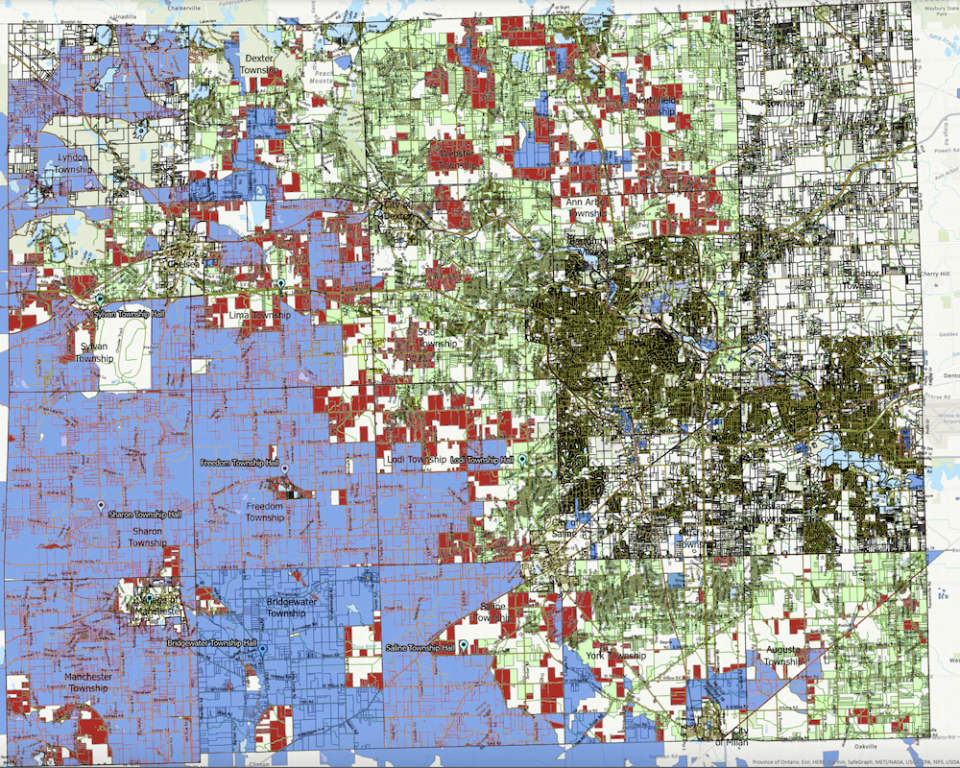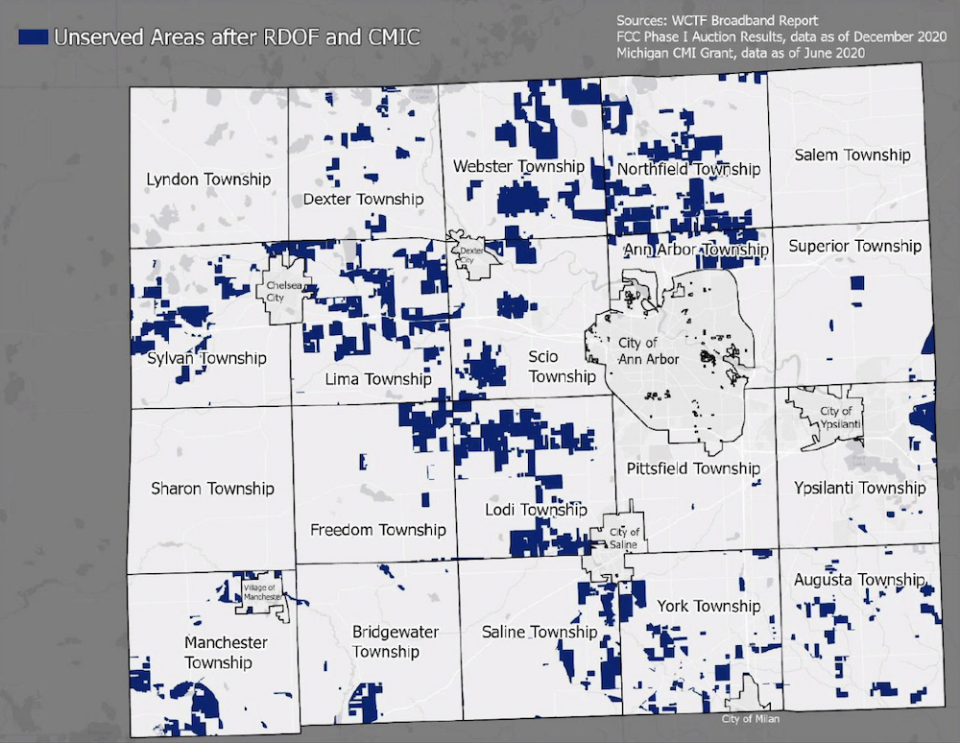
As communities across the country are working to bring more affordable, reliable Internet access to their residents, one county in Michigan is gearing up to reach every household within its bounds. On Wednesday night, the Washtenaw County Board of Commissioners held a Ways and Means meeting and unanimously approved a resolution obligating state funding, including American Rescue Plan funds, to several initiatives, with $14.6 million dollars being allocated to broadband infrastructure.
Although some communities in the county have made progress in recent years in improving connectivity, thousands of households have been left with broadband at basic speeds. While many are slated to receive service via the recent wins by Mercury Broadband (a Kansas-based ISP, focused on connecting rural America) and Midwest Energy and Communications (MEC, a Michigan electric cooperative) from the 2020 Rural Digital Opportunity Fund (RDOF) auction, there are still 17 townships scattered across the county with more than 3,000 households that remained unserved.
Back in May, the Washtenaw County Broadband Task Force put out a Request for Proposal (RFP) to plug the remaining holes, with the Task Force signalling its general happiness with the responses in the recent meeting. The allocation on Wednesday, if it receives final approval in the near future, will be used to fund the project proposals the Broadband Task Force is currently negotiating with four ISPs: Midwest Energy and Communications, Washtenaw Fiber, Comcast and Charter-Spectrum.
This vote brings the Washtenaw County Broadband Task Force one step closer to its goal of countywide broadband equity. Its $14.6 million dollar plan will either be approved or vetoed by the County Board of Commissioners on Sept. 15.
The Journey to Countywide Broadband Equity
The Washtenaw County Broadband Subcommittee was formed in 2017 to assess the county’s broadband coverage and make recommendations about how to achieve “countywide broadband equity” by 2022.
The Subcommittee came out with a report on the state of broadband in the county in 2018. According to the report, 8,000 households in the county did not have the FCC’s minimum acceptable broadband of 25/3 Megabits per second (Mbps), and with a majority of the unserved areas being rural.
In May 2020, Washtenaw County Broadband Task Force (formerly the Broadband Subcommittee) released a report detailing the findings of a survey the Task Force put together in partnership with the Merit Network’s Michigan Moonshot team. Together, they developed and deployed a survey of 15 townships with unserved areas. The results showed stark differences in the FCC data and the lived reality of the community members in the townships.
While the FCC data show that 98 percent of the county has access to 25/3 Mbps broadband, the survey found that only 37 percent of homes have 25/3 Mbps. The survey found that 31 percent of homes have less than 25/3 Mbps, and 32 percent more homes have no internet connectivity at all.

MEC was awarded $37 million through the 2020 Rural Digital Opportunity Fund (RDOF) auction to build out more than 3,000 miles of fiber through Allegan, Barry, Berrien, Branch, Calhoun, Cass, Eaton, Hillsdale, Ingham, Jackson, Kalamazoo, Lenawee, Livingston, Monroe, St. Joseph, Van Buren, Washtenaw, and Wayne counties.
MEC started as a rural electric cooperative, but has been working since 2015 to build out broadband infrastructure throughout the state and has expanded to Ohio and Indiana. In 2018, MEC partnered with Lyndon Township to bring a municipally owned fiber-to-the-home network to community members. Today, MEC continues to handle day-to-day operations of the network which has a 75 percent take rate.
According to the Washtenaw County Broadband Task Forces’ RFP, the combination of MEC and Mercury Broadband’s RDOF funds will cover all but 3,317 households throughout the county.
The RFP prioritizes wireline broadband solutions for the build out in 17 scattered townships, with 25/3 Mbps being the minimum acceptable tier, but “strongly” preferring 100 Mbps download speeds. Moving forward with this project is the ultimate step toward having countywide broadband access, said Barb Fuller, Chair of the Broadband Task Force.
“The infrastructure is the first step, because without access to the infrastructure, it doesn’t matter whether you can afford it or not because if it's not there you can’t buy it,” Fuller said.
After receiving proposals from four different ISPs (MEC, Washtenaw Fiber, Comcast, and Charter-Spectrum), the Task Force came up with a number that would fund this countywide endeavor, $14.6 million. The next step was getting the County Board of Commissioners to approve the funds which would be pooled from the state’s American Rescue Plan funds ($4.89 million), recovered lost revenues ($8.78 million), and the general county funds ($1 million).
That’s why Wednesday night's vote was a step in the right direction for Fuller and communities throughout the county.
“This is the culmination of a 20-year effort to provide high-speed Internet access countywide, and it’s really, really exciting,” said County Commissioner Sue Shink on Wednesday night.
While the Task Force is still negotiating with the ISPs, the final contract(s) hope to cover the remaining 3,317 households without access to broadband infrastructure.Two of the ISPs, Comcast and Charter-Spectrum are monopoly providers, while the other two, Washtenaw Fiber and MEC, are locally owned.
In addition to infrastructure, the resolution also included $800,000 in funds to provide assistance to households that have access to broadband infrastructure but cannot afford service. One-third of households throughout the state that do not subscribe to Internet service of any kind indicate the service is too expensive. A plan was not presented to the board of commissioners in the resolution.
The vote was punctuated by a screen full of applauding county commissioners.
“I imagine, if we were in person, we would be hugging,” County Commissioner Justin Hodge said.
While Fuller was glad to see the unanimous vote on Wednesday, she is cautiously optimistic about what the Sept. 15 vote will hold.
“I was pleasantly astounded by how supportive the comments were of the broadband piece. It’s 180 degrees from where we were in June,” Fuller told ILSR. “Based on what I saw [at the meeting] I’m hoping it will be unanimous, with the understanding that [the resolution not only includes] broadband. Broadband is just a piece of what they took up.”

State Politics and Barriers for Municipalities Perpetuate the Broadband Gap
While this approved funding package could mean that countywide broadband is just around the corner in Washtenaw, part of that funding will most likely be going to monopolies, and the municipalities around the state at-large have historically had to navigate a litany of obstacles to owning and operating their own networks.
Municipalities in Michigan are not simply able to decide to build and operate their own networks, they must first issue an RFP for a private provider to come in and build. Only if the RFP receives less than three viable offers can a municipality move forward with building and owning the network. There are also additional requirements that municipalities have to follow, such as holding public forums and submitting cost-benefit analysis and feasibility studies.
There are examples of communities that have been able to overcome those obstacles and build thriving networks, such as Lyndon Township and Traverse City.
In 2019, the state of Michigan established a state broadband grant program. Ben Fineman, Vice Chair of the Washtenaw County Broadband Task Force and President and Co-founder of the Michigan Broadband Alliance, was on the Task Force to recommend the parameters for the program and said that the recommendations he was part of made municipalities eligible for the program. But when it came time to codify the program through the appropriations bill, language was slipped in that excluded municipalities from the funds.
“It was one of those things that at the 11th hour, the lobbyists came in and blew up all the recommendations from our Task Force and put in their own lobbyist language,” Fineman said in a recent interview. “Now, we have this situation where it looks like this infrastructure plan is going to be allocated through the states. So that’s their end game, is locking municipalities out of that money.”
The final language made ISPs the only eligible applicants, kept eligible broadband solutions at 25/3 Mbps, and defined underserved as lacking at least one ISP.
The fight for municipally owned networks to spread throughout the state has been a long slog for folks like Fineman. The partisanship tension between the state legislature and the governor has led to a slow burn on deploying broadband infrastructure.
Whitmer unveiled a High-Speed Internet Office in June, focused on expanding access to reliable and affordable Internet access, and was subsequently criticized by state house representatives as an action without consequence.
“We don’t need more new government committees or dedicated bodies to keep telling us the same information on what needs to happen. The governor should instead stop vetoing legislation that seeks to help broadband expansion efforts,” State Rep. Michele Hoitenga stated in a press release.
In April, Gov. Gretchen Whitmer vetoed H.B. 4210, which would have granted ISPs a personal property tax exemption on broadband infrastructure that provided speeds of 25/3 Mbps in order to spur more investment throughout the state.
However, as we last wrote in May, “There is no evidence that changing these tax policies results in more investment, and there are fears it mostly benefits larger monopolies in areas already considered served.”
Fineman said that one bill that was introduced into the House in June could potentially help reverse the problems presented with the state grant program. H.B. 5032 would change the current language limiting applicants to ISPs, to include applicants that are a “governmental entity, educational institution, or public-private partnership.” It would also change the definition of underserved from 25/3 Mbps to 100/10 Mbps, and the definition of unserved areas from lacking one broadband option to three.
No matter what happens with this legislation, Wednesday’s night vote signals the possibility for significant investment in expanding connectivity in Washtenaw county.
Header Image of Barton Pond, Barton Hills, Michigan courtesy of Dwight Burdette
RDOF Award Map, Washtenaw County, Blue - Proposed RDOF Service Area, Red - Not awarded via RDOF, White - Considered served (currently)







